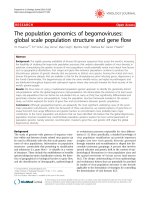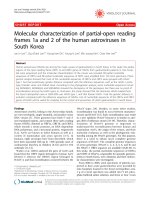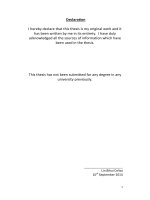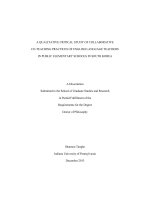Assessment task 3 individual essay APPLE IN SOUTH KOREA COMPANY ANALYSIS
Bạn đang xem bản rút gọn của tài liệu. Xem và tải ngay bản đầy đủ của tài liệu tại đây (323.2 KB, 13 trang )
Assessment Task 3 - Individual Essay:
APPLE IN SOUTH KOREA
COMPANY ANALYSIS
International Business - Assignment 3
Part 1: Background and competitiveness of Apple:
a. Apple company profile:
Apple Inc. is an American multinational technology company headquartered in California. The
firm has been considered one of the largest tech companies in the world (Ponciano, J 2019),
which designs, develops and sells electronics, computer software, and online services. Apple
was founded on April 1, 1976, by Steve Jobs and Steve Wozniak, who brought the change of
new software in electronic devices. In 1984, Apple introduced a new product called Macintosh,
which had never been in the market before. Additionally, there were some problems between
Steve Jobs and Sculley before the corporation of two Steves, which caused Jobs's departure
from Apple. Then, Apple had declined and its competitors (IBM or Microsoft) had risen in
revenue and product quality (Rawlinson, N 2017). Finally, the return of Steve Jobs to Apple has
made this brand as it is today. As mentioned above, Apple mainly sells electronic devices,
computer software, and online services. Specifically, the most well-known Apple products are
Macintosh line of personal computers, the iPod line, iPad (tablet computers) and the iPhone.
According to Mediakix, Apple has sold approximately 1,379,960,000 iPhone units worldwide in
2018 and reached 1.3 billion in active iOS installations (Mediakix). At a glance, in 2019, Apple
has expanded 506 stores in 24 countries, including 272 stores located in the U.S. and 234
Apple stores internationally, such as Australia or South Korea. Apple operates through
operating segments: the Americas, Europe, Japan, Great China, the rest of Asia Pacific and
other factors. Additionally, Apple has used the online and retail stores to sell products to
different consumers and enterprises. The company distributes its product line through
wholesalers, resellers, national and regional retailers.
b. Core resources and competitiveness of Apple:
Threshold capabilities are the need for one organization to meet the demand for necessary
requirements from customers and compete with potential competitors in the given market.
Without those capabilities, the organization could hardly survive in the market (Kiran, M &
Sayers I). To survive and become one of the largest electronics companies, Apple indeed
adopted Threshold capabilities. Apple’s tangible assets are Steve Jobs, unique design and
retail stores. Since Apple has been on top of the electronics industry, it is clear that the founder
of Apple, Steve Jobs is a valuable asset to the company, who has a unique approach
2
International Business - Assignment 3
and a clear vision for Apple. Bill Gates had also stated that there were rarely people
having a profound impact as Steve Jobs had (BBC 2011). Moreover, Apple has been
successful in its programs and designs, thanks to professional programmers and
designers. OS X and iOS are two successful operating systems, making Apple stand
out in the electronics industry. In terms of retail stores, as mentioned above, there are
roughly 507 retail stores in total. By providing customer service in both online and retail
stores, it helps Apple gain a right brand image and customer loyalty. Apple’s retail
stores, which are one of the critical resources, contribute largely to its success.
Moreover, any firms still need to have their unique resources and capabilities, which could be a
valuable competitive advantage for firms. In Apple, its unique design and program capability are
one of the competitive advantages that no competitors imitate or obtain. As mentioned above,
Apple has used its OS X and iOS operating systems, which is easy usage and also a unique
competence, help Apple gain customer loyalty and increase its brand image. Apple’s
programmers also provide new update iOS versions for customers to make their electronic
devices better, compared to the old ones. Apple products such as iPhone, iPad, iPod, and
Macintosh line, have unique designs that bring Apple success and be ahead of the competitors.
Apple has come up with unique interface designs and focused on quality and different look for
its products, make this brand can compete in the electronics market. Another core competitive
advantage is Innovation strategy. iTunes is one of the innovation strategies of Apple, that brings
Apple prominent in the music industry. More to the point, each year, Apple has launched a new
iPhone to catch customers’ awareness, maintain their loyalty and could increase profit.
According to UKEssays (2018), the company has only spent 3.7% of its revenue on R&D and
preferred to focus on innovating the knowledge of employees. Since using an Innovation
strategy as a competitive advantage, helping Apple not merely differentiates itself from other
competitors but it also increases brand image and properties. Apple is one of the pioneering
companies in creating new operating systems, unique features and interface designs,
compared to Samsung, Nokia or LG.
VRIO framework of some of Apple’s resources and capabilities:
Design & Program
Retail stores Innovation Strategy
3
International Business - Assignment 3
Valuable
Rare
Costly to imitate
Organized to
capture value
Part 2: Current political situation of Korea:
Multinational enterprises are defined as a firm that engages in Foreign Direct Investment.
Apple is a company that has invested in many countries, from developing to developed
countries. South Korea has one of the largest and most diversified companies in the world.
This country is known as the one that has increased its economy from one of the poorest to
one of the most successful, rising GDP per capita in just one generation. In fact, South
Korea and Japan were inherently dissatisfied with each other, especially those related to the
Japanese colonial period. Most recently, Japan was upset when the South Korean court
demanded Japanese compensation for forced labor during World War 2 (Salmon 2019).
Tensions between Japan and South Korea erupted after July 1 when Japan said it would
impose an export restriction on Seoul on the three most important high-tech materials used
in the manufacture of semiconductor components and screens. Corporations such as
Samsung or LG import 90% of this material from Japan (Huang, E 2019). Additionally, Japan
has just removed Korea from the list of “White countries” of 27 countries with preferential
treatment on trade, this means that Korea will be deprived of the privilege of allowing it
access to Japanese goods without having to go through cumbersome procedures. In
response, South Korea is considering restricting OLED display exports to Japan in retaliation
(Ryall, J 2019). The wave of boycotts in Japan has risen, 23.000 retailers have pulled
Japanese goods off shelves, and announced they would never buy products from this
country.
Apple is America-firm that has been influenced by the above political issues. Firstly, a
technological war has affected trade between Korea and Japan. It has damaged many
Korean
4
International Business - Assignment 3
technology brands, including Samsung, SK Hynix, LG and even Apple. As mentioned above,
Japan restricts the export of essential components to South Korea, meaning that the export ban
continues to be maintained and affects the supply chain of many electronic devices. South
Korea-Japan disputes that the risk of disrupting semiconductor supplies cannot be reached at a
harder time for Apple. Apple has struggled to stabilize its iPhone business amid declining sales,
shipments, and profit. The figure has dropped down, compared to Quarter 1 in 2019 (Appendix
1). Also, the search for semiconductor components and chips will increase the price of Korean
Smartphone products. Therefore, Apple will have a more competitive advantage in current
Korea’s political situation, comparing to both price and quality. On the other hand, in the KoreaJapan situation, the national pride of the Koreans will somehow increase, which was essential
to Koreans in the Japanese colonization period (Chung & Choe 2008). That directly affects the
volume of imported goods. To be more specific, Apple will be less focused on the Korean
electronics industry market; in other words, Koreans tend to purchase their country goods. In
terms of electronic devices, according to Appendix 2, Koreans prefer Android software over
iOS, about 47.8% in September this year (GlobalStats). Therefore, since the Japan-Korea
conflict, Apple may lose a certain number of Korean consumers, leading to its profit would be
reduced.
Part 3: MNE’s strategy in the host country:
After analyzing the current political in Korea, determining Apple’s strategy and entry mode
decision is also necessary. According to Harzing (2000), through Barlett and Ghoshal’s model,
MNEs have been affected by the forces of global integration and local responsiveness,
including Global (standardisation), International, Multidomestic (localisation) and Transnational.
Since Apple has made a differentiation in centralizing its domestic products to local customers'
needs, it is considered that Apple is using Global Strategy, based on Barlett and Ghoshal’s
model. Furthermore, license and distribution agreement are two strategies Apple has used to
meet local customers’ needs as entry mode choices, which Root (1987) has stated that an
institutional arrangement can bring company products, technology, people skills, management
or other resources into foreign countries.
Strategy and Structure of Apple:
5
International Business - Assignment 3
The primary strategy Apple has used is Global strategy, which is defined as a competitive
strategy aimed at increasing profits on the basis of global cost reduction. The way they chose
this strategy in order to bring high customer value in Korea. Through the help of this strategy,
Apple has developed a strong market share in South Korea, approximately 28,3% in 2018 by
making differentiation in cross-border service (Business Standard 2018). Compared to the
previous years, Apple has been more widely accepted than before in South Korea. According to
Scientiamobile (2018), iPhone X has been a top phone in this operation, with the number larger
than Samsung products, which has proven that Apple has successfully targeted a certain
number of Korean local customers. In terms of brand value, Apple has made a differentiation in
its products, operating systems and unique designs, making Apple remarkable in Korea's
electronic industry market. Apple's global strategy also provides Apple with competitive
advantages that tackle the threats and challenges of the industry, such as Samsung, LG and
SK Hynix. Additionally, low imitations from other rivals would be a significant competitive
advantage for Apple in South Korea. However, Ghoshal (1987) has stated that in the context of
Global strategy, firms may face such competitive risks due to the fact that the competitions
response can take place in many different forms and in many different markets. In other words,
this threat could create opportunities for entrants to leap in and satisfy the empty needs of
customers, thus creating a new market. Accepting that Apple had strong competitive
advantages, it was otherwise shown in Appendix 2 that Koreans prefer to use the Android
operating system and that their company's products can not meet the specific requirements of
each region, implying that Apple has not focused on the needs of Korean consumers.
According to Erramilli & Rao (1990), the lack of specific business information and knowledge
has generated confusion and increased risks. As a result, under these conditions, decisionmakers are becoming more cautious about what assets Apple is introducing to this foreign
market.
Market entry:
According to Hill (2013), the diverse model of Dunning shows the acceptance claim of
internationalization theory that it is a struggle to get a corporation to license its unique and
know-how. Apple has a closed environment that demands the highest quality consumer
monitoring. For these reasons, Apple has never licensed its product lines for sale through
foreign market before, that means Apple follows the foreign direct investment strategy and
6
International Business - Assignment 3
creates their own way to expand business to South Korea. Since they developed an entry
mode, Apple has used licensing approaches as a strategy for increasing its operations in Asia
Pacific, which are perceived to be essential to Apple's sales (Rains 2018). Applying the
licensing strategy, Apple applied control over its operation and strategically emphasizes and
reduces risk factors for regulatory issues and restrictive investment barriers (Aulakah, Cavusgil
& Sakar 1998). Moreover, South Korea is a country that has many risks due to the fierce
competitors and its market has almost saturated. Therefore, a distribution agreement with a
local phone carrier is one of the most reasonable ways to enter South Korea. A distribution
contract requires less expense but may result in a conflict of interest that arises if Apple’s sales
reach a certain level. This approach gives Apple opportunities to test the market without
spending assets upfront. Hence, licensing and distribution agreements are two suitable
solutions to enter Korean markets quickly.
Nonetheless, these internationalization modes generate great rivalry on the Korean market
because Samsung will have to shift its strategy to compete better with Apple. Moreover, Apple
may have recognized social, economic, and religious influences and issues that affect business
success. In terms of culture, Korea is a very traditional country, so the perception of welcoming
others is an integral part of their daily lives. This country is also known to have respected its
cultural traditions; thus, considering that Apple has worked in Korea, it must be mindful of some
of the cultural impacts in order to avoid upsetting the essential customs of the Korean people,
despite their differences with those of the United States, which may increase the perception of
its consumers and increase the reputation of Apple in Korea.
Possible alternative actions:
Throughout analyzing and looking at how Apple operated in South Korea, it is clear that Apple
has been successful and is struggling to enter this highly competitive market. Moreover, Apple
Inc's future lies in the growth of its core competencies to improve its expansion strategy
(Blonigen 2001). As a result, managers are able to gain diverse perspectives on the effects of
the chosen strategy and structure, consumer demands and cultural differences in order to
make the needed changes and improvements to business strategies and retain the competitive
advantages of Apple. With regard to Apple's operation, there are still approaches that can be
applied to solve some of Apple’s issues in consumers'
7
International Business - Assignment 3
demand. In order to respond quickly to the current Korean technological trend, Apple should
investigate clearly what suitable technology devices or software Koreans are looking for.
Furthermore, the appropriate marketing strategies in Korea could make Apple more aware of
and better image brands. This leads to quicker adjustment to the needs of consumers, which
offers Apple a better competitive advantage. In addition, to gain competitive advantages, the
best way to enhance brand reputation and increase consumer purchase intention is to act as a
corporate socially responsible company to improve its CSR plan. South Korea is the next
country that Apple has operated since this brand announces to use 1000% clean energy to
protect
the
environment
in
every
product
(Edward
2019).
Nonetheless,
these
internationalization modes generate great rivalry on the Korean market because Samsung will
have to shift its strategy to compete better with Apple. Moreover, Apple may have recognized
social, economic, and religious influences and issues that affect business success. In terms of
culture, Korea is a very traditional country, so the perception of welcoming others is an integral
part of their daily lives. This country is also known to have respected its cultural traditions; thus,
considering that Apple has worked in Korea, it must be mindful of some of the cultural impacts
in order to avoid upsetting the essential customs of the Korean people, despite their differences
with those of the United States, which may increase the perception of its consumers and
increase the reputation of Apple in Korea.
Part 4: Reference lists:
Aulakh, P., Cavusgil, S. & Sarkar, M. J 1998, ‘Compensation in International
Licensing Agreements’, International Business Study, 29: 409, DOI:
/>Baig, E 2019, ‘Apple on the environment: Doing right for the planet is good for business’,
Phys.org, < />
Blonigen, B 2001, “In search of substitution between foreign production and
exports,” Journal of International Economics, vol.53 no.2, pp.81-104.
8
International Business - Assignment 3
Business Standard 2008, ‘Samsung still market leader in S Korea; Apple’s market share at
record 28%’, Business Standard, viewed 20 October 2019, < orea-apple-smarket-share-at-record-28-118021900547_1.html>.
Chung, K & Choe, H 2008, ‘South Korean national pride: Determinants, changes and
suggestions’, ResearchGate, viewed 17 October 2019,
< />
minants_changes_and_suggestions>.
Erramilli, M. & Rao, C 1990, ‘Choice of Foreign Market Entry Modes by Service Firms:
Role of Market Knowledge’, Management International Review , 30(2), 135-150.
Ghosal, S 1987, ‘Global Strategy: An Organizing Framework’, Strategic
Management Journal, 08(5), 425-440.
Harzing, A 2000, ‘An Empirical Analysis and Extension of the Bartlett and Ghoshal
Typology of Multinational Companies’, Journal of International Business Studies ,
vol. 31, no. 1, pp. 101-120.
Hill, C. W 2013, International business: competing in the global marketplace. New York:
McGraw-Hilled/Irwin.
Huang, E 2019, ‘Japan-South Korea dispute is a sign that the world order is ‘collapsing,’ says
trade expert’, CNBC , viewed 17 October 2019,
< />
order-expert.html>.
iWonder, ‘Steve Jobs: Hippy, Apple boss and icon’, BBC, viewed 18
October 2019, < />Kiran, M & Sayers I, ‘3 STRATEGIC CAPABILITIES Learning outcome’, Academia ,
viewed 26 October 2019,
< />
s>.
9
International Business - Assignment 3
Mediakix, ‘12 Apple Statistics Marketers Should Know In 2018’, Mediakix ,
viewed 15 October 2019, < />Ponciano, J 2019, ‘The Largest Technology Companies In 2019: Apple Reigns As
Smartphones Slip And Cloud Services Thrive’, Forbes, viewed 15 October 2019,
< />
2019/#4b3708f4734f>.
Rains, B 2018, ‘Why Asia Might Be Apple’s Most Important Market’, Nasdaq, viewed 20
October 2019,
< />
5-03>.
Rawlinson, N 2017, ‘History of Apple: The story of Steve Jobs and the company he
founded’, MacWorld, viewed 16 October 2019,
< />
Root, F 1987, Entry strategies for international markets , Lexington Books,
Massachusetts, USA.
Salmon, A 2019, ‘Korean forced laborer demands compensation, apology’, AsiaTimes ,
viewed 15 October 2019,
< />
pology/>
Scientiamobile 2018, ‘Top Phones in South Korea’, viewed 21 October 2019,
< />UKEssays 2018, ‘A Strategic Capability Analysis For Apple Apple Inc Marketing Essay”,
viewed 10 October 2019,
< />
arketing-essay.php?vref=1>.
Part 5: Appendix:
10
International Business - Assignment 3
Appendix 1: The profit that Apple gains in 2019Q2.
< />
11
International Business - Assignment 3
Appendix 2: The figure of comparing between Apple and Samsung’s operating system.
< />
12









